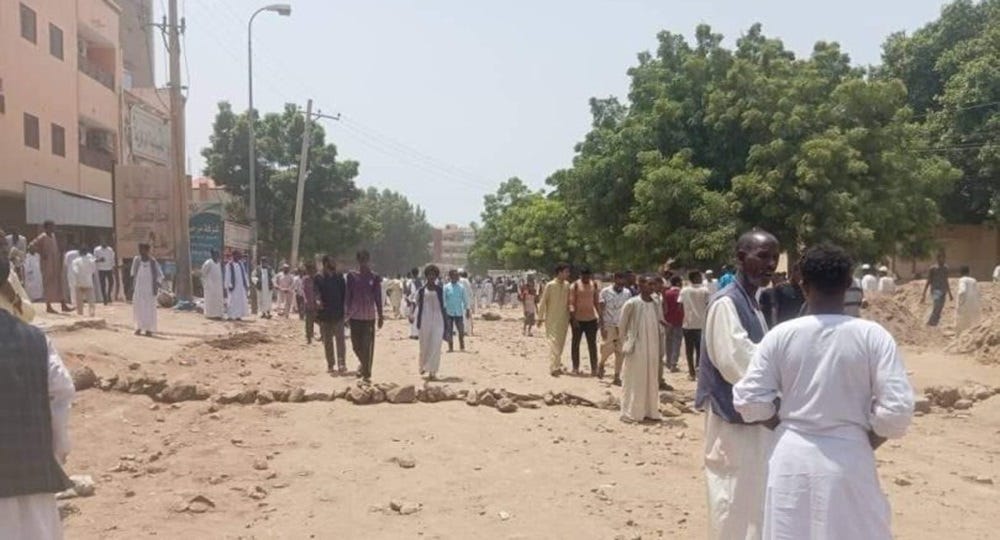Torture victim's death sparks protests in Eastern Sudan
City on Eritrean border on edge after eruption of public fury
The eastern Sudanese city of Kassala was gripped by widespread protests earlier this week following the death of a 25-year-old man in the custody of the General Intelligence Service (GIS). Al-Amin Mohamed Nur died of torture just hours after his arrest last Friday, sparking public outrage and calls for justice.
Protesters blocked major thoroughfares in Kassala, the capital of Kassala State, and staged a sit-in at the public prosecutor's office, demanding a thorough investigation and the prosecution of those responsible for the detainee's death. Local authorities responded by using tear gas and firing live ammunition in the air to disperse the protest, but there were no reported injuries.
Extrajudicial arrests, disappearances, and even killings are not uncommon in Sudan’s military-controlled areas since the outbreak of civil war last year, but the public response to this incident was unusual.
The public fury that swept Kassala is reminiscent of the protests of 2018-19, which briefly ended military rule in Sudan. The protests point to continuing distrust and dissatisfaction with the security service of the Sudanese military regime, which is led by lieutenants of the now ousted dictator, Omar al-Bashir.
Additionally, the unrest in Kassala signals ethnic tensions between the local Ben Amer tribe and the central/riverine Sudanese who dominate the security service.
Authorities initially refused to hand over Nur's body to his family. However, following public pressure, five GIS officers and soldiers supposedly were arrested and transferred to a detention facility for further investigation. The body was finally allowed to be taken by the family.
Nur's death has sparked widespread condemnation across Sudan. A spectrum of the Sudanese public, including parties from the country's only anti-war civilian coalition known as Taqaddum, has criticized the incident.
The Sudanese Congress Party (SCP), led by Omar El-Digeir, issued a strong statement condemning the crime and describing it as a brutal act committed by the Islamist regime during its 30-year rule in Sudan.
“We, in the Sudanese Congress Party, pray for the soul of the martyr Al Amin Mohamed Nur and send our sincere condolences to his honorable family. We condemn this heinous crime, which represents an extension of the same crimes of assassination under torture and serious violations that the General Intelligence and Security Service of the defunct Salvation Regime [referring to the National Islamic Front] has been accustomed to committing throughout its brutal rule, especially the crime of assassinating the martyr, Professor Ahmed El-Kheir at the hands of the same members of the service in Kassala,” the statement said.
The group criticized what they described as a "coup authority" in Port Sudan for targeting civilians based on identity or ethnicity and for silencing voices rejecting the war. They called on authorities in the de facto capital to cease violations against innocent civilians and suspend anti-war sentiments that have hindered peace talks with the Rapid Support Forces (RSF).
“We call on the coup authority in Port Sudan to immediately stop all violations against civilians and targeting them on the basis of identity or ethnicity or to settle political disputes, or to silence the loud voices rejecting the war that have become annoyance to Al-Burhan in its movement and travel in the areas controlled by armed forces,” the statement said.
Meanwhile, the National Umma Party, a prominent political force whose overthrow in 1989 brought Omar el Bashir to power, has also issued a strongly worded statement condemning the killing of Al-Amin and calling for justice. In their statement, the party highlighted the security apparatus's history of such abuses and called for an end to the impunity enjoyed by those who commit these crimes. They also urged the international community to intervene and ensure that justice is served.
“The National Umma Party strongly condemns the heinous crime committed by the security apparatus in Kassala state, where the young man, Al-Amin Mohamed Noor, was arrested, tortured, and killed. The security apparatus in Kassala state has a long history of such heinous crimes that violate the law and the constitution. Previously, they committed the same crime against the martyr Ahmed Al-Kheir and others,” the statement said.
The country's junta in Port Sudan this year enacted a contentious new law granting the General Intelligence Service (GIS) broad authority and legal immunities, sparking concerns over a return to the repressive practices seen under the regime of former President Omar al-Bashir.
The GIS Law, amended in May during a joint session of the Transitional Sovereign Council and the Council of Ministers, significantly expands the powers of intelligence officers. Under the new provisions, GIS personnel are authorized to collect information, summon and interrogate individuals, conduct surveillance, carry out searches, detain suspects, and seize assets. The law also grants sweeping immunity to GIS members, protecting them from criminal and civil prosecution unless approved by the head of the agency.
In cases involving capital punishment, the director has the authority to establish a special court:
“Any act committed by any member of the agency in good faith during or because of the performance of his job duties, or the performance of any duty imposed on him, or from any act issued by him under any authority authorized or granted to him under this law, shall not be considered a crime,” the law said in its article 52.
The NUP statement linked this law to the escalating violence and abuses committed by security forces in Sudan and called on the government to reconsider the law and prioritize the protection of civil liberties and human rights.
The party also expressed particular concern over the ongoing fighting between the Sudanese Armed Forces (SAF) and the Rapid Support Forces (RSF) in the western Darfur region. The NUP has warned that the new GIS law could further exacerbate the conflict and lead to increased human rights violations.
“Despite the fact that the post-revolution constitutional document limited the security apparatus's tasks to collecting and analyzing information and submitting it to the higher authorities of the state without exercising the power of arrest, the restoration of the apparatus's previous powers after the April 15 war has led it to commit numerous crimes against citizens in many areas of Sudan's states without any accountability,” it said.
Wajdi Saleh, a prominent anti-war politician who is also a member of Taqaddum and former head of the National Salvation Dissolution Committee, also condemned the GIS law and the actions of security forces. He emphasized that the people of Sudan stand united in their demand for justice and retribution for the victims of violence.
News in brief
The commander of Sudan’s paramilitary Rapid Support Forces (RSF), Mohamed Hamdan Daglo, has lost his government-verified checkmark on X, formerly known as Twitter. Daglo, also known as Hemedti, was removed from the Transitional Sovereign Council in 2023 after the outbreak of war with the Sudanese Armed Forces. The removal of the verification tick, while seemingly insignificant, could be seen as a sign that X no longer recognizes Daglo as a legitimate government figure.
A coalition of human rights groups, professional bodies, political parties, and women's groups in Sudan launched a national campaign on Thursday to extend the mandate of the UN Fact-Finding Mission in the country. The mission, established by the UN Human Rights Council in October 2023, investigates widespread violations linked to the ongoing conflict in Sudan. The campaign aims to push for an extension of the mission's mandate during the upcoming UN Human Rights Council session on September 9.
South Sudan's Western Bahr el Ghazal State authorities say Sudan's Rapid Support Forces (RSF) have occupied several areas and are exploiting mineral resources, especially gold. The commissioner of Raja County told Radio Tamazuj on Tuesday that the areas under RSF control include Radom, Kafia Kinji, Sungu, and Hofra Al Nahas. However, the SSPDF commander in Raja County denied the RSF's presence in the county.
Support our journalism
Thank you for reading Sudan War Monitor. We do this work because we believe that journalism is one accountability mechanism that ultimately can contribute toward peace and justice in Sudan—however distant that hope may be. Our work is intended to be a resource for humanitarians, civil society, ordinary Sudanese, diplomats, and news media. Subscribe or share to support our work and #KeepEyesonSudan.



